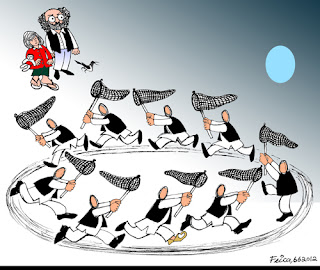No, this post is not about Syria but it is about continuing the flagging, in a bite size fashion, of my burning question about History with a capital H in Algeria and how it is being told and written, bearing in mind that a succession of regimes in DZ since independence have been narrating by force and coercion a very slanted, if not purely fabricated historical narrative.
Who is safekeeping the real* memory of Algerians and Algeria? How can this History be kept alive, be told and accessed. I believe that DZ writers (novelists, poets, that is 'fiction' not non-fiction) are playing that role.
So, as I was meeting one of Syria's great writers, Nihad Sirees, for the wonderful Arab Lit to talk about literature, I thought I'd ask about the role of the writer as a historian. Here it is.
*I know, what is real... but I think that largely by this term I mean 'factual' and most importantly, I mean investigative and investigated (these two forming the biggest problem of DZ journalism).

Comments